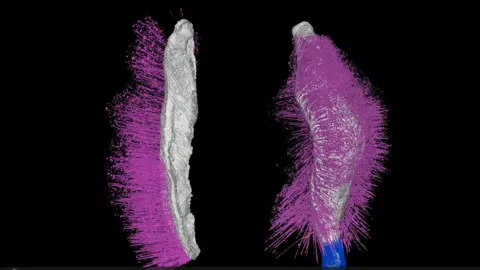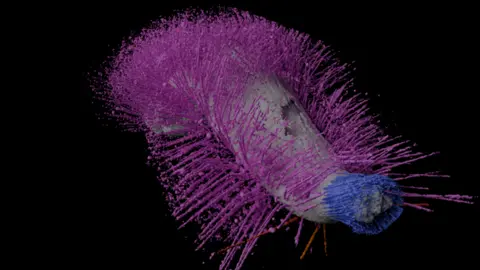Scientists discover 430 million-year-old fossils
 Dr Mark Sutton / Imperial College London
Dr Mark Sutton / Imperial College LondonScientists have unearthed two 430 million-year-old fossils which they say challenge previously held views on the origins of molluscs.
The specimens, nicknamed Punk and Emo, were found in Herefordshire and date back to a time when most of southern Britain was covered by sea, according to the University of Leicester.
Academics said the find had challenged the belief that early molluscs, from a group known as Aculifera, were basic and primitive creatures.
The discovery has been illustrated using 3D modelling to show how the creatures appeared.
 Dr Mark Sutton / Imperial College London
Dr Mark Sutton / Imperial College LondonUniversity of Leicester palaeontologist Dr David Siveter was part of an international team that found the fossils.
Analysis has shown Punk and Emo had smooth undersides, indicating they likely lived on the seabed.
The findings have been published in the journal Nature.
Dr Siveter said: "These 430 million-year-old fossils demonstrate the crucial importance of so-called 'exceptional preservation', in which soft parts of the animal are fossilised, to the interpretation of the evolution of life, in this case shedding new light on the early history of one of the fundamental branches of the evolutionary tree of a major group of life on Earth, the molluscs."
The present-day mollusc family includes snails, cephalopods and mussels.
'Exceptionally well preserved'
Dr Mark Sutton, from Imperial College London, led the research.
He said: "The names Punk and Emo were actually our initial pet names for these ancient molluscs, inspired by some of their unique features and individuality.
"Punk in particular, with its spiky appearance, clearly resembles a rebellious punk rocker and we thought Emo complemented it well."
He added: "Early Aculiferan molluscs are much less well-known than some of their relatives.
"We have limited information about this group, and for a very long time, we assumed they were rather basic, simple and primitive.
"Retrieving fossils that are so exceptionally well preserved and reveal details of the soft tissues is extremely rare.
"We have been able to create virtual fossils – 3D digital models – providing us with a gold mine of information and helping us understand that the branch of molluscan evolution containing Emo and Punk was much more evolutionarily rich and diverse than we thought."
Follow BBC Leicester on Facebook, on X, or on Instagram. Send your story ideas to [email protected] or via WhatsApp on 0808 100 2210.
